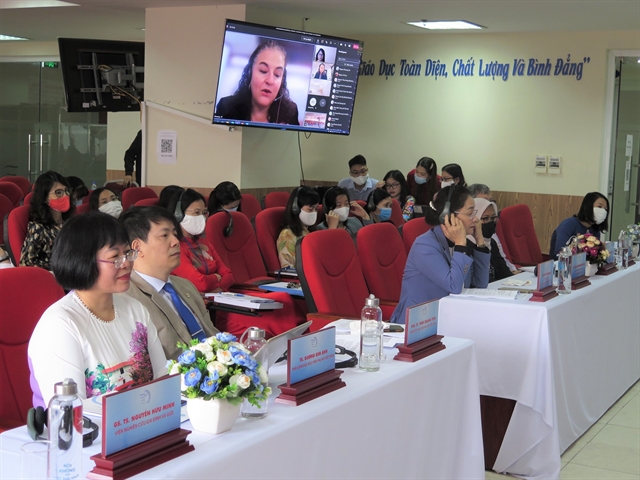 Society
Society

Differences in access to resources and society's perceptions lead to different responses to disaster and environmental issues in men and women, highlighting the importance of gender equality in face of climate change, according to studies presented at the international conference “Gender in Climate change and Disaster Risk Reduction” on October 26.

|
| The international conference “Gender in Climate change and Disaster Risk Reduction” on October 26. — Photo Vietnam Women's Academy |
HÀ NỘI — Differences in access to resources and social perceptions lead to different responses to disaster and environmental issues in men and women, highlighting the importance of gender equality in the face of climate change, according to studies presented at the international conference “Gender in Climate Change and Disaster Risk Reduction” on October 26.
Hosted by the Vietnam Women’s Academy, the conference presented research findings on four topics: theoretical issues of gender in climate change and disaster risk reduction; climate change and disaster risks – current status and gender issues raised in various fields; international and Vietnamese experiences and practices in ensuring gender equality in the response to climate change and disaster risk reduction; and other gender-related content in climate change and disaster risk reduction.
“Việt Nam is one of the nations most impacted by climate change. According to a study by the World Bank, Việt Nam ranks 91st out of 191 countries facing high disaster risk levels (on the INFORM index), and 16th globally in terms of severe impacts due to climate change related disasters. Việt Nam has seen extreme weather events and natural disasters increasing in terms of both frequency and intensity,” said Trần Quang Tiến, Director of Việt Nam Women’s Academy, at the conference.
According to Trần Thị Hương, Vice-President of the Việt Nam Women’s Union: “Men and women have different roles and strengths in response to climate change, with distinctive needs, interests and abilities. It is impossible to see women as ‘secondary’ or ‘passive’, and we must acknowledge they have significant contributions alongside men in regard to disaster response, risk reduction, and recovery. Therefore, different approaches are required for individuals to flourish based on their potential, interests and aspirations no matter their gender; and to facilitate the participation of women in decision-making, planning and action against climate change at all levels.”
Speaking at the event, Elisa Fernandez Saenz, Country Representative of UN Women in Vietnam, also said more actions were needed to translate Việt Nam’s commitments into national policies – here lies the important role of researchers and academics in providing information and evidence for policy-making, and raising the discussion of gender in climate change.
The conference saw participation from both Vietnamese and international experts and representatives from various educational institutions and organisations in Việt Nam.
Starting in the morning with theoretical issues on the matter, the event continued into the afternoon with case studies on several specific topics and locations.
The conference publication includes nearly 40 scientific reports selected from over 70 papers submitted to the symposium.
This scientific conference is part of the EmPower Project “Strengthening Human Rights and Gender Equality through Climate Change Action and Disaster Risk Reduction” funded by the Swedish International Development Agency (SIDA).
The event is hosted by Vietnam Women’s Academy in collaboration with UN Women and the National Foundation for Science and Technology Development (NAFOSTED). — VNS